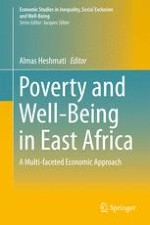2016 | OriginalPaper | Buchkapitel
7. Determinants of Consumption Expenditure and Poverty Dynamics in Urban Ethiopia: Evidence from Panel Data
verfasst von : Oumer Berisso
Erschienen in: Poverty and Well-Being in East Africa
Aktivieren Sie unsere intelligente Suche, um passende Fachinhalte oder Patente zu finden.
Wählen Sie Textabschnitte aus um mit Künstlicher Intelligenz passenden Patente zu finden. powered by
Markieren Sie Textabschnitte, um KI-gestützt weitere passende Inhalte zu finden. powered by
